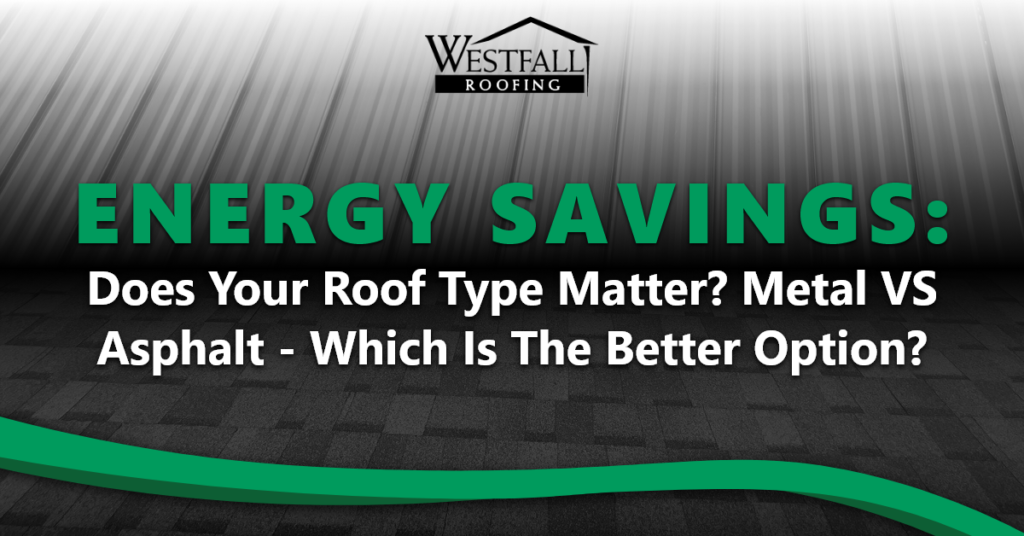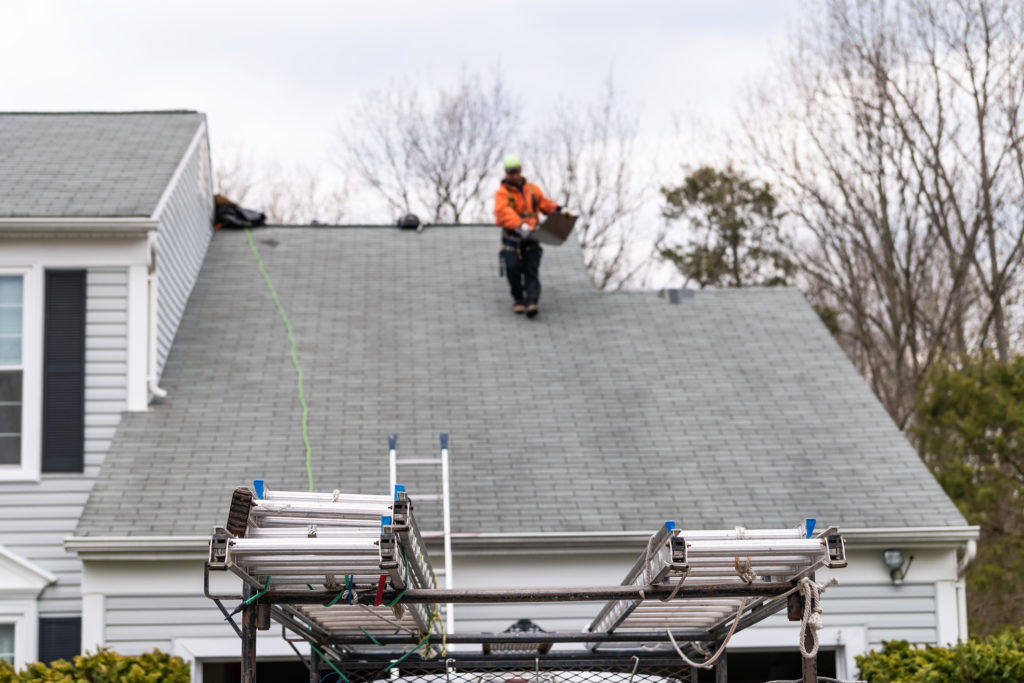The most popular residential roofing materials today are metal and asphalt. As a homeowner, picking the best between the two can be challenging. After all, both have their fair share of perks. For starters, metal roofs are durable and eco-friendly. Conversely, asphalt shingles are affordable and easy to install.
Asphalt and metal roofs are quite different in terms of energy efficiency. One can help you save energy and lower utility bills more than the other. At Westfall Roofing, we know energy-efficient products are a homeowner’s best friend and have compiled this article to help you pick the best roofing material.
Which Roof Type Has Better Energy Efficiency?
Both a metal roofing system and asphalt shingles are energy-efficient. The former’s efficiency comes from its ability to reflect heat away from buildings. On the other hand, manufacturers make asphalt shingles with special, solar-reflecting granules designed to reduce heat absorption and transfer.
Considering the above, metal roofs are more energy-efficient than asphalt shingles for the following reasons:
Low thermal mass
Metal has low thermal mass. This means this material absorbs, stores, and releases less heat. This feature is indispensable because a roofing system susceptible to excessive heat absorption or dissipation can force your heating, ventilation, and air conditioning system to work harder, leading to spiking utility bills.
This quality also enables metal roofs to trap less heat. Suppose your home has a roofing system that absorbs and retains extreme heat levels. In this case, the issue will lead to high temperatures in your living spaces, forcing you to use your air conditioning system for extended periods. This leads to increased energy consumption and higher bills. But metal roofing doesn’t encourage such problems.
On the other hand, asphalt shingles have higher thermal mass. They often take longer to cool down or heat up and hold in heat. Therefore, if you opt for these materials, chances are higher that your home will have a heat sink (an area where heat collects) near the roof, which can reduce its ability to cool down.
Superior reflective properties
Several factors lend metal roofs superior reflective properties. First, materials like steel and aluminum have a high solar reflectance, at around 60%. This quality allows metal roofs to reflect more of the sun’s solar energy, leading to lower absorption rates and comfortable temperatures within a building.
Metal roofing panels reflectivity can be measured by the SRI index or “Solar Reflective Index”. The higher the SRI number, the greater the ability to reflect solar energy from the surface. Moreover, highly reflective metal roofing paint can have cool pigments, otherwise called cool roof coatings or finishes. These paint finishes can greatly help increase the SRI of the metal panel. Most cool pigments or coatings contain silicone or acrylic. Experts brush or paint these substances onto existing roof surfaces, boosting their solar reflectivity and resistance.
Simply put, cool roof coatings or finishes increase metal roofing’s energy-saving properties.
Asphalt shingles are less reflective compared to metal roofing components. White shingles, which are supposed to have optimum solar reflectance, are only around 30% reflective. Other darker colors reflect much less. To summarize, since asphalt shingles don’t reflect high amounts of solar energy, they encourage increased heat transfer into your home, which can be a big issue in summer.
Solar-Friendliness
One of the simplest ways to boost your home’s energy efficiency is by installing a solar energy system. Mounting panels on your roof will help you reduce reliance on utility companies and associated electricity bills. This can be a huge plus, especially in the US, where residential electricity prices spike constantly.
If getting a residential solar energy system sounds grand, a metal roof can make the process easier. Why? Modern metal roofing systems are undeniably the best at solar panel compatibility because they are strong and can hold several panels, mounting racks, etc.
Which Other Qualities Make Metal Roofing a Superior Option?
Besides energy efficiency, metal roofs have numerous other enticing qualities, including:
- Low maintenance needs: A metal roof is low maintenance. If you choose this system, the only activities you’ll need to hire professionals to tackle include cleaning panels, gutters, and drains. This is crucial in eradicating dirt, grime, algae, and debris stuck in your roof’s dead spots and valleys.
- High longevity: A metal roof can last a very long time. Your system’s longevity will depend on several factors, including weather, ventilation, and installation. An asphalt roof’s maximum lifespan is 30 years.
- Eco-friendliness: Manufacturers make metal roofing components from recycled materials. Also, when replaced, they are 100% recyclable. This makes metal roofs one of the most eco-friendly roofing options available today.
- Most, if not all, painted metal panels are energy-star-rated. Shingles are not.
Enjoy Optimum Energy Savings Today
A residential metal roofing system can help you cut energy consumption and enjoy more savings compared to asphalt shingles. These roofs come with energy-efficient components designed to reflect solar energy and absorb store, and release less heat.
Would you like to reap the energy savings associated with a metal roof? Contact Westfall Roofing now. Our roofing experts can help you install durable components with highly reflective properties. We also install asphalt shingles and tiles. Reach out today for the best roofing service in the Tampa Bay and Sarasota areas.





